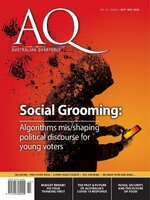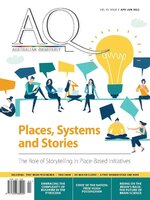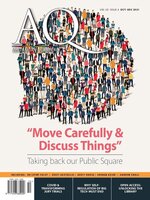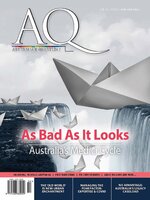For over 90 years AQ: Australian Quarterly has been packing its pages with the debates that have shaped Australia and the world, tackling the big topics in science, politics and society. Grounded in evidence, yet written in a style accessible to everyone, AQ is unique in Australia’s publishing landscape, pushing back against the trends of subjective truth and media spin. If it matters to Australia then it matters to AQ.
A WORD
AQ: Australian Quarterly
Human Health in the Anthropocene: A Systems Approach for Action on Climate and Health • The last century has seen remarkable gains in life expectancy and population health outcomes, and significant declines in metrics such as child mortality. Yet traditional global health and public health agendas have not generally considered whether improvements in health were made at the expense of the natural systems on which we depend for our food, safe water, and clean air.1 As our planet is pushed closer to its limits, the potential trade-offs between health and the environment is forcing us to redefine our agendas, and consider ‘planetary health’.
Who Decides Who Decides What Conversations Are Allowed About Artificial Intelligence? • American internet scholar, David Post, wrote a book entitled In Search of Jefferson’s Moose: Notes on the State of Cyberspace,2 in which he poses the question: Who decides who decides? He asks this question about the Internet, using the historical lens of Thomas Jefferson and how he used data. The key people, Post argues, are not the decision-makers themselves—the people with the ultimate power are those who decide who gets to decide.
The Politics of Distraction • A narrow focus on climate change is depoliticising environmental and development problems and allows many stakeholders to escape their responsibilities. The recent history of climate diplomacy in the Pacific Islands indicates that the UN Framework Convention on Climate Change risks evolving into a series of dogmas that distract us from the local origins of vulnerability and ways to address it.
Rewilding Our Cities: Green Roofs for Green Targets • Creating urban green infrastructure is a crucial step in promoting urban sustainability and climate resilience. Green infrastructure includes natural and seminatural elements such as green spaces, parks, rain gardens, and green roofs and walls. This provides ecological, social, and economic benefits, such as improved air quality, reduced noise pollution, food production, stormwater management, carbon capture, and improved human health and well-being.
A Fair COP Climate and Consensus on the World Stage • The annual climate summit rolled into the Egyptian resort town of Sharm-El-Sheik last November like an international carnival of lobbyists, corporates, activists, negotiators, ministers, and the odd head of state. Yet despite the incongruous look of festivity – with acres of temporary pavilions rising out of the desert, as is increasingly the case with each UN climate summit – the stakes are remarkably high.
REFERENCES

 95.2 Apr-Jun 2024
95.2 Apr-Jun 2024
 95.1 Jan-Mar 2024
95.1 Jan-Mar 2024
 94.4 Oct-Dec 2023
94.4 Oct-Dec 2023
 94.3 July-Sept 2023
94.3 July-Sept 2023
 94.2 Apr-June 2023
94.2 Apr-June 2023
 94.1 Jan-Mar 2023
94.1 Jan-Mar 2023
 93.4 Oct-Dec 2022
93.4 Oct-Dec 2022
 93.3 July-Sept 2022
93.3 July-Sept 2022
 93.2 Apr-June 2022
93.2 Apr-June 2022
 93.1 Jan-Mar 2022
93.1 Jan-Mar 2022
 92.4 Oct-Dec 2021
92.4 Oct-Dec 2021
 92.3 Jul-Sept 2021
92.3 Jul-Sept 2021
 92.2 Apr-June 2021
92.2 Apr-June 2021
 92.1 Jan-Mar 2021
92.1 Jan-Mar 2021
